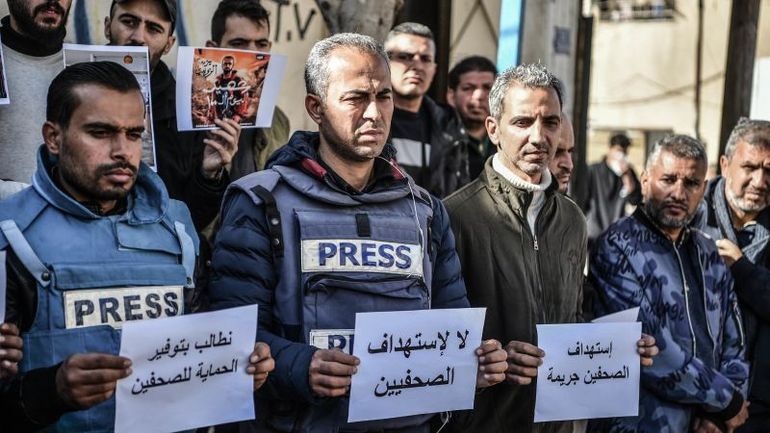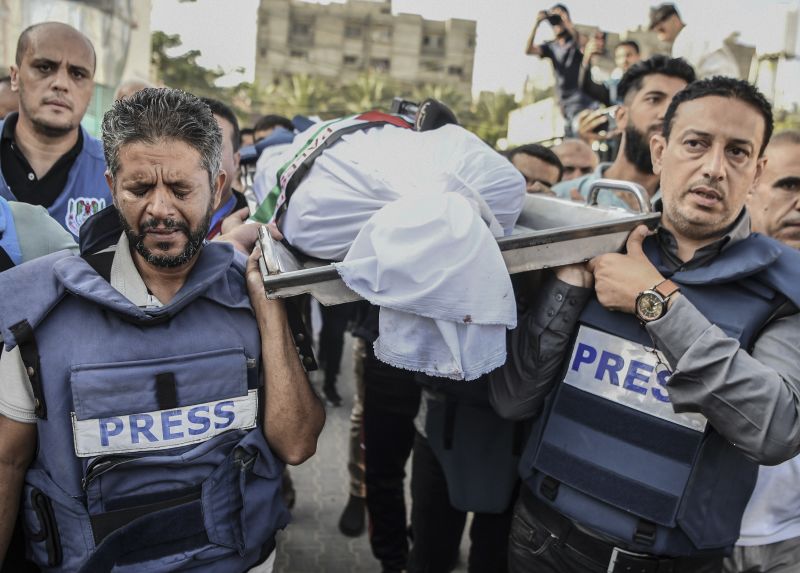
Concerns rise over Israel's targeting of journalists reporting on the conflict with Hamas

Israel faces growing scrutiny and demands for transparency regarding the targeting of journalists who are documenting the ongoing conflict with Hamas, raising concerns about press freedom and safety.
The Israeli military is avoiding answering questions and taking responsibility for the deaths of journalists who were reporting on the ongoing conflict with Hamas.
Since the October 7 terrorist attacks, at least 95 journalists have lost their lives in the region, with 90 of them being Palestinian, as reported by the Committee to Protect Journalists. This organization has been closely monitoring the increasing number of journalist casualties and has noted that this is the deadliest conflict for journalists since they began collecting data in 1992.
Despite the high number of journalist fatalities, the Israel Defense Forces have not provided clear explanations about the circumstances surrounding these deaths. Instead, they have given vague statements stating that their forces do not deliberately target journalists or that the incidents are currently under investigation.
A funeral ceremony was conducted to honor the memory of Mohammed Abu Hatab, a Palestine TV correspondent who tragically lost his life, along with his family members, in an airstrike on his home in Khan Yunis, Gaza on November 03, 2023. 
Journalists risk their lives in the field to report on the brutal realities of war to the world. Unfortunately, simply issuing statements is not enough to address the dangers they face. Recently, two reports have emerged that raise important questions for the IDF regarding the killing of journalists in two separate incidents.
Last week, the United Nations released a report on the killing of Reuters journalist Issam Abdallah in southern Lebanon. The report concluded that an Israeli tank had fired at a group of journalists, who were clearly identifiable, in violation of international law. CNN also confirmed this, noting that the journalists were wearing body armor labeled "PRESS."
In response to the U.N. report, the Israeli Defense Forces (IDF) stated that they do not intentionally target civilians, including journalists, and expressed their support for a free press. However, Reuters editor-in-chief Alessandra Galloni has called for Israel to provide a more detailed explanation of the incident and to hold those responsible accountable. As of now, this has not happened.
Members of the press, who try to perform their duties in the Gaza Strip, carry banners reading 'the press is free and cannot be silenced.'
Members of the press, who try to perform their duties in the Gaza Strip, carry banners reading 'the press is free and cannot be silenced.'
On Tuesday, The Washington Post released a report that brought up concerns about a different incident. This time, it was about a missile attack on January 7 that resulted in the deaths of two Al Jazeera journalists and two freelancers. Initially, the IDF stated that they targeted and hit a terrorist who was flying a drone that posed a threat to their troops.
The aircraft in question was a consumer-grade drone, as reported by The WaPo. The newspaper obtained and reviewed the footage captured by the drone, which was shared online. The footage showed no Israeli soldiers, aircraft, or military equipment. The WaPo spoke to 14 witnesses and colleagues of the journalists who were killed. Additionally, two analysts examined satellite imagery covering a 1.2 mile radius of the area on the day of the attack. Neither analyst found any evidence of military activity, raising questions about how the drone could have been a threat to IDF personnel.
When The WaPo reached out to the IDF for comment on their findings, a spokesperson responded with, "We have nothing more to add."
Outside such lethal incidents, the Israeli military has also come under increased scrutiny for its general treatment of journalists in the region.
Flowers and candles are placed among pictures of journalists at a vigil in lower Manhattan on November 6, 2023, in New York City. The vigil is held to remember and celebrate the lives of journalists killed in recent fighting in Israel, Gaza and Lebanon.
Flowers, candles, and pictures of journalists were arranged at a vigil in lower Manhattan on November 6, 2023, in New York City. The gathering was a way to honor and remember the journalists who lost their lives in the recent conflicts in Israel, Gaza, and Lebanon.
Spencer Platt/Getty Images
Al Jazeera reported on Monday that one of its correspondents, Ismail al-Ghoul, was detained by IDF forces for 12 hours before being released. According to the Qatari-funded network, al-Ghoul was arrested at Al-Shifa Hospital while reporting, and was allegedly "severely beaten" and held captive with other journalists.
After his release, al-Ghoul accused Israeli forces of destroying his broadcasting equipment and subjecting the journalists to harsh treatment. He claimed that they were stripped, forced to lie face down, blindfolded, and had their hands tied. Al-Ghoul also stated that Israeli soldiers would fire shots to intimidate them if there was any movement.
On Tuesday morning, after checking in with the IDF multiple times, I finally received a comment from a military spokesperson.
Journalists, relatives and friends pray over the body Journalists Sari Mansour and Hassouna Esleem after they were killed in an Israeli bombardment of Bureij camp in the central Gaza Strip on November 19, 2023.
Journalists Sari Mansour and Hassouna Esleem were tragically killed in an Israeli bombardment of Bureij camp in the central Gaza Strip on November 19, 2023. Relatives and friends gathered to pray over their bodies in a solemn moment of mourning. Majdi Fathi/NurPhoto/Getty Images captured the heartbreaking scene.
The IDF spokesperson stated that they were not aware of the detention of a man named Ismail Al-Ghoul. When I inquired about the possibility of journalists being detained at the hospital, the response provided did not directly address the question. Despite asking multiple times, there was no clear answer from the IDF regarding the detention of journalists.
It is important to note that the responses from the Israeli military do not reflect well on them. While operating in a war zone is challenging, it is unacceptable to target journalists and mistreat those who risk their lives to report from the conflict, as emphasized by press advocates and news organizations.
An open letter signed by thirty-six news leaders, including heads of CNN, the Associated Press, The New York Times, and BBC News, highlighted that attacks on journalists are attacks on truth.
Journalists are risking their lives to cover the war, and unfortunately, many are losing their lives in the process. Each time a journalist dies, we lose valuable insights from the conflict-ridden area. It is crucial for Israel, as the authority over its military, to provide clear explanations for the deaths of journalists.
Unfortunately, the IDF has not been transparent in this regard so far.
Editor's P/S:
The Israeli military's lack of transparency and accountability regarding the deaths of journalists during the conflict with Hamas is deeply concerning. The high number of fatalities, including 90 Palestinian journalists, is a tragic testament to the dangers faced by those reporting on the conflict. The IDF's vague statements and failure to provide clear explanations raise serious questions about its commitment to protecting journalists and upholding international law.
The reports by the United Nations and The Washington Post provide compelling evidence that the IDF may have violated international law by targeting journalists. The UN report concluded that Israeli fire killed Reuters journalist Issam Abdallah, while The WaPo investigation found that the IDF's claim of targeting a threatening drone was unsubstantiated by evidence. These incidents highlight the need for independent investigations and accountability to ensure that journalists can operate safely and without fear of reprisal. and freedom must be respected. The IDF's actions not only put journalists at risk but also undermine the credibility of the information they provide. It is crucial for the international community to pressure Israel to ensure the safety and protection of journalists and to hold it accountable for any violations of press freedom.















